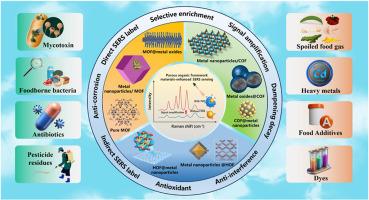基于多孔有机骨架材料的SERS传感在食品危害分析中的研究进展
IF 15.4
1区 农林科学
Q1 FOOD SCIENCE & TECHNOLOGY
引用次数: 0
摘要
食品安全已成为一个重要的全球问题,因为各种食品危害污染了食品供应链,对公众健康构成重大风险。因此,发展快速可靠的检测技术对于保证食品质量和保障人类健康至关重要。表面增强拉曼光谱(SERS)由于其高灵敏度和非破坏性的特点,已被广泛认为是一种有效的食品危害分析技术。为了进一步提高检测性能,多孔有机框架(POFs)由于其高比表面积、可调节的孔隙率和优异的吸附能力而成为食品安全SERS传感中有前景的材料。本文综述了基于pof的SERS传感技术的最新进展及其在食品安全领域的应用前景。首先,综述了SERS的基本原理(即电磁增强和化学增强)以及用于SERS传感的pof基材料的合成策略。然后,讨论了pof基材料在SERS传感中的关键作用及其对SERS信号增强和稳定性改善的贡献。最后,综述了基于pof的SERS平台在食品危害检测中的应用前景。令人印象深刻的是,对这一新兴领域的挑战和未来的研究方向进行了批判性的讨论。结论基于spof的SERS技术具有高灵敏度、选择性和易用性等优点,在食品安全检测中具有广阔的应用前景。值得注意的是,它与便携式设备和人工智能辅助分析的集成可以实现实时的现场监控。本文章由计算机程序翻译,如有差异,请以英文原文为准。

Recent advances on porous organic framework material-based SERS sensing for the analysis of hazards in food
Background
Food safety has become a critical global issue as various food hazards contaminate the food supply chain, posing significant risks to public health. Accordingly, the development of rapid and reliable detection technologies is essential to ensure food quality and safeguard human health. Benefiting from its high sensitivity and non-destructive nature, surface-enhanced Raman spectroscopy (SERS) has been widely recognized as an effective analytical technique for the analysis of food hazards. To further improve the detection performance, porous organic frameworks (POFs) have emerged as promising materials in SERS sensing for food safety due to their high specific surface area, tunable porosity, and excellent adsorption capacity.
Scope and approach
In this review, we comprehensively summarized the latest advancements in POF-based SERS sensing and their promising applications in the field of food safety. First of all, the fundamental principles of SERS (i.e., electromagnetic enhancement and chemical enhancement) and the synthesis strategies of POF-based materials for SERS sensing were summarized. Then, the key roles of POF-based materials in SERS sensing and their contributions to SERS signal enhancement and stability improvement were discussed. Finally, the promising applications of POF-based SERS platforms for the detection of food hazards were reviewed. Impressively, the remaining challenges and future research directions in this emerging field were critically discussed.
Key findings and conclusions
POF-based SERS technology shows great promise for food safety detection, offering high sensitivity, selectivity, and ease of use. Notably, its integration with portable devices and AI-assisted analysis enables real-time, on-site monitoring.
求助全文
通过发布文献求助,成功后即可免费获取论文全文。
去求助
来源期刊

Trends in Food Science & Technology
工程技术-食品科技
CiteScore
32.50
自引率
2.60%
发文量
322
审稿时长
37 days
期刊介绍:
Trends in Food Science & Technology is a prestigious international journal that specializes in peer-reviewed articles covering the latest advancements in technology, food science, and human nutrition. It serves as a bridge between specialized primary journals and general trade magazines, providing readable and scientifically rigorous reviews and commentaries on current research developments and their potential applications in the food industry.
Unlike traditional journals, Trends in Food Science & Technology does not publish original research papers. Instead, it focuses on critical and comprehensive reviews to offer valuable insights for professionals in the field. By bringing together cutting-edge research and industry applications, this journal plays a vital role in disseminating knowledge and facilitating advancements in the food science and technology sector.
 求助内容:
求助内容: 应助结果提醒方式:
应助结果提醒方式:


